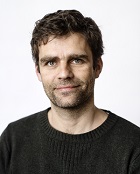15 million DKK to research project on international organized crime
Professor Henrik Vigh has received a Consolidator Grant of 2 million euros from the European Research Council for his project "Criminal Entanglement". The project will undertake a comprehensive ethnographic study of international organized crime
International organized crime is one of today's major global problems. Trafficking, drug smuggling, money laundering and other transnational crimes are related to terrorism and a gradual breakdown of communities around the world. Although international crime is high on the political agenda, our knowledge remains limited and fragmented.

A new research project "Criminal Entanglement" led by Professor Henrik Vigh, Department of Anthropology, will contribute to a new and more detailed knowledge of the social infrastructure of international crime. Through an extensive ethnographic study, the project will investigate what happens when people and illegal drugs move from West Africa via Morocco to Spain, France and throughout Europe. The project has been granted DKK 15 million by the European Research Council through a so-called consolidator grant to Professor Henrik Vigh.
"Criminal Entanglement" is an interdisciplinary project with the participation of anthropologists, criminologists and political scientists. Assistant professor Matthew Carey, Postdoc Trine Korsby, PhD student Line Richter and PhD student David Sausdal, all from the Department of Anthropology, will participate in the project. Nikolas G. Emmanuel from the Department of Political Science is also part of the research group.
We don’t exactly know what happens
Henrik Vigh is looking forward to start the project, which is based around a completely new and unique type of research.
- This grant allows us to put together a research group that is going to deal with something that very few others are dealing with - transnational ethnographic criminology. There is much numeric based research showing that international organized crime is happening, but we do not know exactly what happens. We know that drugs, money and people are floating around in these criminal systems, but what exactly is happening on the ground, we know very little about. It is this knowledge that the project will contribute with, says Henrik Vigh.
"Criminal Entanglement" runs until the end of 2021.
Summary of the project description
Linked to terrorism, moral breakdown, and societal decay, Transnational Organised Crime (TOC) has come to embody current global anxieties as a figure of fear and cause of disquiet. Yet despite its central position on the social and political radar, our knowledge of it remains limited and fragmentary. Quantitative analyses may have identified the scale of the problem, but its underlying socio-cultural logics and practices remain under-researched and largely obscure. TOC is on the rise, and we need better insights into how it develops and expands, who engages in it and why, and how it is linked to and embedded in social networks that straddle countries and contexts.
CRIMTANG proposes a unique approach to the study of the social infrastructure of contemporary TOC. It develops a research strategy that is ethnographic and transnational in design and so attuned to the human flows and formations of TOC. The project comprises an interdisciplinary research team of anthropologists, criminologists and political scientists, and builds on their prior experience of the people, regions and languages under study. It explores the illegal and overlapping flows of migrants and drugs from North-West Africa into Europe, following a key trafficking trajectory stretching from Tangier to Barcelona, Paris and beyond.
In so doing, CRIMTANG sheds new light on the actual empirical processes in operation at different points along this trafficking route, whilst simultaneously developing new theoretical and methodological apparatuses for apprehending TOC that can be exported and applied in other regions and contexts. It reimagines the idea of social entanglement and proposes new transnational and collective fieldwork strategies. Finally, it will advance and consolidate the European research environment on TOC by creating a research hub for transnational ethnographic criminology at the University of Copenhagen.
Contact
Henrik Erdman Vigh
Professor
Department of Anthropology
Øster Farimagsgade 5, 1353 Copenhagen K
Building 16, office 16.0.18
Mail: hv@anthro.ku.dk
Phone: +45 35 32 34 91
